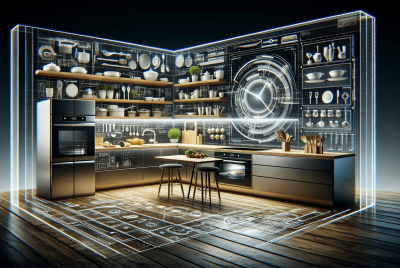Should You Install Appliances Before Countertops?
Thinking of renovating your kitchen? One question that often comes up is whether you should install appliances before countertops. It’s an important decision that can impact the overall functionality and aesthetics of your kitchen. In this article, we’ll explore the pros and cons of both options, helping you make an informed choice for your kitchen remodeling project. When it comes to kitchen renovations, one of the key decisions you’ll need to make is whether to install your appliances before or after the countertops. While there isn’t one right answer that applies to every situation, it’s important to consider the pros and cons of each option before making a decision. In this article, we’ll explore the advantages and disadvantages of installing appliances before countertops, as well as the factors to consider and the installation processes involved. Whether you’re considering a new integrated appliance installation or a custom countertop design, we’ll give you the information you need to make an informed choice.

Pros of installing appliances before countertops
One of the main advantages of installing appliances before countertops is that it allows for proper measurement and fit. When the appliances are already in place, it becomes much easier to take accurate measurements and ensure that the countertops fit perfectly around them. This can help prevent costly mistakes and ensure a seamless, professional-looking installation.
Another benefit of installing appliances before countertops is that it allows for easy installation and connection. With the appliances already in place, the installation process becomes more straightforward, as the countertops can be easily maneuvered and installed without the risk of damaging or scratching them. Additionally, connecting the appliances to the plumbing and electrical systems is easier when they are already in position.
Lastly, installing appliances before countertops reduces the risk of damage to the countertops. Countertops are often made from delicate materials such as granite or quartz, which can be easily scratched, cracked, or chipped during the installation process. By installing appliances first, you eliminate the risk of accidentally damaging the countertops while maneuvering heavy appliances into place.
Cons of installing appliances before countertops
While there are many advantages to installing appliances before countertops, there are also some potential drawbacks to consider. One of the main concerns is the potential difficulty in aligning and leveling the appliances. If the appliances are not properly aligned, it can affect the overall aesthetic appeal of the kitchen and make it more challenging to install the countertops evenly.
Another con of installing appliances before countertops is that it may result in increased labor and time. Since the appliances are already in place, the countertops need to be carefully installed around them, which can be a more time-consuming and labor-intensive process compared to installing the countertops first and then placing the appliances on top.
Lastly, installing appliances before countertops can limit your options for appliance placement. Once the appliances are installed, it may be challenging to make changes to their position without disrupting the countertops. This can be a disadvantage if you decide to rearrange your kitchen layout or if you need to replace an appliance in the future.
Factors to consider before installing appliances before countertops
Before deciding whether to install appliances before countertops, it’s essential to consider several factors to ensure a successful installation. First and foremost, consider the availability of the appliances you want to install. If you have already purchased your appliances or have specific models in mind, it may make more sense to install them first and then fit the countertops around them.
Another factor to consider is the type of countertops you plan to install. Some countertop materials, such as granite or quartz, require precise measurements and fabrication, which may be easier to accomplish if the appliances are already in place. On the other hand, if you opt for a prefabricated or modular countertop, it may be more efficient to install the countertops first and then adjust them as needed to accommodate the appliances.
Space constraints and layout are also important considerations. If you have limited space in your kitchen or a complex layout, it may be more practical to install the appliances before the countertops to ensure a proper fit.
Finally, consider the plumbing and electrical considerations. Installing the appliances before the countertops allows for easier access to the plumbing and electrical connections, making the installation process more straightforward.
Cases where appliances should be installed before countertops
While there are situations where installing countertops before appliances is the better choice, there are also cases where installing appliances first makes more sense. One such scenario is when you are integrating or installing built-in appliances. Integrated appliances are designed to blend seamlessly with your cabinetry and require precise measurements and installation. By installing these appliances before the countertops, you can ensure a seamless, custom-fit look.
Another case where installing appliances before countertops is recommended is when the appliances have specific dimensions and specifications. If you have purchased appliances that are unusually sized or have unique installation requirements, it may be easier to install them first and then customize the countertops to fit precisely.
Complex plumbing or venting requirements can also be a determining factor in favor of installing appliances before countertops. If your appliances require intricate plumbing or ventilation systems, it may be necessary to install the appliances first to ensure proper connections and functionality.

Cases where countertops should be installed before appliances
While there are certainly advantages to installing appliances before countertops, there are also instances where it makes more sense to install the countertops first. One such case is when you are using prefabricated or modular countertops. These countertops are typically pre-cut and come in standard sizes, making it easier to install them first and then adjust as needed to accommodate the appliances.
If you’re planning a custom countertop design that requires intricate fabrication and precise measurements, it may be best to install the countertops before the appliances. This allows the countertop fabricators to take accurate measurements and create a custom template that fits perfectly around the appliances.
Additionally, installing the countertops first can provide more flexibility in terms of appliance placement. If you anticipate wanting to rearrange or replace your appliances in the future, installing the countertops first allows for easier adjustments without disrupting the countertop installation.
Installation process when appliances are installed before countertops
If you decide to install appliances before countertops, there are several steps involved in the installation process. First, accurate measurement and planning are crucial. Take precise measurements of the appliances and the surrounding space to ensure a proper fit. Plan the layout to optimize functionality and aesthetics.
Next, wire and connect the appliances according to the manufacturer’s specifications. This includes connecting them to the plumbing and electrical systems. Ensure that all connections are secure and meet the necessary codes and regulations.
Once the appliances are connected and in place, level and align them correctly. This is crucial for both the functionality and visual appeal of the kitchen. Use a level to ensure that the appliances are balanced and adjust them as needed.
With the appliances properly installed and aligned, it’s time to proceed with the countertop installation. Depending on the type of countertops you are using, this may involve cutting, shaping, and adhering the countertops to fit precisely around the appliances. Finish the installation by sealing and polishing the countertops for a professional, finished look.
Installation process when countertops are installed before appliances
If you choose to install the countertops before the appliances, the installation process will differ slightly. First, measure and fabricate the countertops to fit the dimensions of your kitchen, accounting for any appliances that will be installed later.
Once the countertops are fabricated, it’s time to proceed with the installation and finishing. Install the countertops carefully, ensuring that they are level and secure. Connect any necessary plumbing fixtures, such as sinks or faucets.
Once the countertops are in place, align and install the appliances. Take accurate measurements to ensure that the appliances fit properly within the designated spaces. Make any necessary adjustments to ensure that the appliances are level and properly aligned.
Finally, complete the installation by connecting the appliances to the plumbing and electrical systems. Ensure that all connections are secure and meet the necessary codes and regulations. Test the appliances to ensure that they are functioning correctly.
Tips for successful installation of appliances before countertops
If you decide to install appliances before countertops, there are several tips you can follow to ensure a successful installation. First and foremost, consult with professionals throughout the process. Kitchen renovations can be complex, and it’s essential to seek advice from experienced contractors and installers to ensure that everything is done correctly.
Careful measurement and planning are key to a successful installation. Take accurate measurements of the appliances and the surrounding space and plan the layout carefully to optimize functionality and aesthetics. Double-check all measurements before proceeding with the installation.
Clear communication with contractors is crucial. Communicate your expectations and requirements clearly to ensure that everyone is on the same page. Regularly communicate with your contractors during the installation process to address any concerns or issues promptly.
Finally, sequencing of installation steps is important. Ensure that each step of the installation process is completed in the proper order to prevent any issues or delays.
Tips for successful installation of countertops before appliances
If you opt to install the countertops before the appliances, there are also several tips to keep in mind. Accurate measurement and template creation are crucial for a successful installation. Ensure that all measurements are precise and provide the countertop fabricators with accurate templates to ensure a perfect fit.
Choosing reputable countertop fabricators is essential. Do your research and select professionals with a proven track record of quality workmanship. This will help ensure that your countertops are fabricated and installed correctly.
Proper leveling and installation techniques are crucial when installing countertops before appliances. Take the time to ensure that the countertops are level and secure, as this will impact the overall functionality and visual appeal of your kitchen.
Lastly, coordinate with appliance installation professionals if you’re installing the countertops before the appliances. Provide them with the necessary information and measurements to ensure that the appliances fit correctly within the designated spaces.
Conclusion
In conclusion, the decision to install appliances before or after countertops in your kitchen renovation ultimately depends on your individual circumstances and priorities. Consider factors such as integrated appliance installations, appliance dimensions and specifications, complex plumbing or venting requirements, as well as countertop types, space constraints, and layout.
Whether you choose to install appliances before countertops or vice versa, it’s crucial to consult with professionals, carefully measure and plan, and communicate effectively with contractors. By evaluating your installation requirements and priorities, you can make an informed decision that will result in a successful and visually stunning kitchen renovation.



